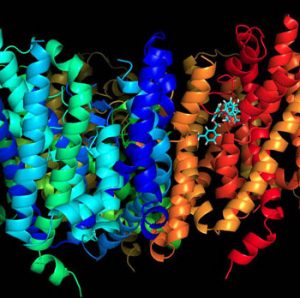Home_Page_Research News

|
Study examines prostate cancer treatment decisions A five-year follow-up study of U.S. men who received prostate cancer treatment is creating a road map for future patients to clarify expectations and enable men to make informed choices about care. Friday, January 3rd, 2020 |

|
Study seeks to boost breast tumor immune response Targeting specific molecules in breast tumors, called methylating agents, can turn up the immune response, potentially making tumors responsive to immunotherapy, suggests a new study published in Nature Communications. Thursday, February 8th, 2018 |

|
VUMC researchers find a way to ‘starve’ cancer Researchers at Vanderbilt University Medical Center (VUMC) have demonstrated for the first time that it is possible to starve a tumor and stop its growth with a newly discovered small compound that blocks uptake of the vital nutrient glutamine. Thursday, January 18th, 2018 |

|
Researchers find novel mechanism of resistance to anti-cancer drugs The targeted anti-cancer therapies cetuximab and panitumumab are mainstays of treatment for advanced colorectal cancer, the second leading cause of cancer-related deaths in the United States. However, many patients have tumors with genetic mutations that make them resistant to these anti-epidermal growth factor receptor (EGFR) monoclonal antibodies, or the cancers develop resistance during treatment. Friday, October 20th, 2017 |

|
Investigators match novel cancer mutations with potential therapies Research led by Vanderbilt-Ingram Cancer Center (VICC) investigators may have solved a mystery about why a targeted therapy stops working in a small group of breast cancer patients. They identified a novel gene mutation that develops in the tumors, and then found a different cancer drug that appears to treat the newly identified mutation. The […] Monday, August 7th, 2017 |

|
Drivers of breast cancer metastasis Overexpression of HER2 (human epidermal growth factor receptor 2) is found in about 25 percent of breast cancers and is associated with poor outcomes. HER2-amplified breast cancers use signaling through a complex of proteins called mTORC2 to drive tumor formation, tumor cell survival and resistance to HER2-targeted therapies. Rebecca Cook, Ph. Thursday, July 27th, 2017 |

|
Metastatic pancreatic cancer ‘reprograms’ for malignancy Metastatic pancreatic cancer — cancer that has spread from the pancreas to other tissues and is responsible for most patient deaths — changes its metabolism and is “reprogrammed” for optimal malignancy, according to new findings reported Jan. 16 in Nature Genetics. It may be possible to reverse the malignant reprogramming to treat metastatic pancreatic cancer, […] Thursday, January 19th, 2017 |

|
V Foundation grants bolster cancer initiatives Two Vanderbilt-Ingram Cancer Center (VICC) investigators have earned grant awards from The V Foundation for Cancer Research, continuing the foundation’s support for innovative cancer research initiatives at VICC. Raymond Blind, Ph.D. Thursday, November 17th, 2016 |



